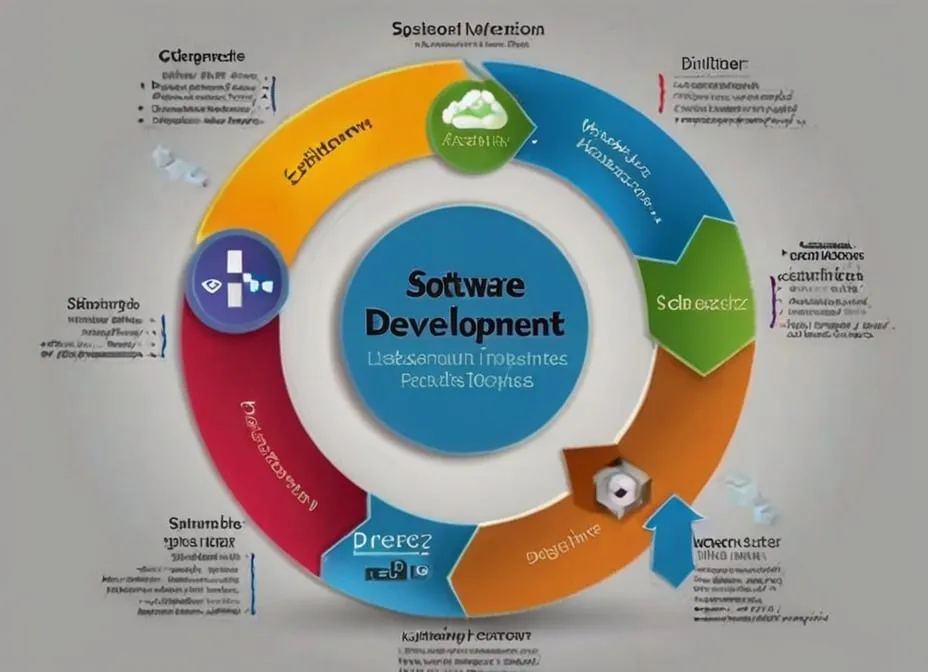Best Tech Jobs: A Comprehensive Guide to Thriving Careers
1.1. The Evolving Landscape of Technology

In today's rapidly changing world, technology is the driving force behind many of the innovations that shape our lives. From the smartphones in our pockets to the complex systems that power our cities, technology has become an integral part of our existence. As technology continues to evolve, so too does the demand for skilled professionals who can harness its power and unlock its potential.
1.2. The Impact of Tech on Society
Technology has revolutionized the way we live, work, and communicate. It has opened doors to new opportunities, streamlined processes, and connected people across the globe. However, with these advancements come challenges, such as ensuring privacy, security, and ethical practices. Tech professionals must navigate these challenges and ensure that technology is used responsibly and for the betterment of society.
1.3. The Importance of Tech Careers
Tech careers are not only in high demand but also offer a unique opportunity to shape the future. Whether you're passionate about coding, data analysis, cybersecurity, or emerging technologies, a tech career can be both intellectually stimulating and financially rewarding. With the right skills and mindset, you can contribute to groundbreaking innovations and make a lasting impact on the world.
1.4. The Diversity of Tech Jobs
The tech industry is vast and encompasses a diverse range of careers, each with its own unique set of responsibilities and challenges. From software development and programming to data analysis and cybersecurity, the possibilities are endless. This guide will explore some of the best tech jobs, providing insights into their roles, responsibilities, and the skills required to succeed in these dynamic fields.
2. Software Development and Programming

2.1. Web Developer
Web developers are the architects of the digital world, responsible for building and maintaining websites that are both visually appealing and functionally robust. From creating dynamic user interfaces to integrating complex back-end systems, web developers play a crucial role in shaping the online experience.
Key Responsibilities:
- Designing and developing responsive and user-friendly websites
- Writing clean, efficient, and scalable code using programming languages like HTML, CSS, JavaScript, and various frameworks
- Collaborating with designers, project managers, and other developers to ensure seamless project execution
- Implementing security measures and optimizing website performance
- Staying up-to-date with the latest web development trends and best practices
2.2. Mobile App Developer
In a world where smartphones and tablets have become ubiquitous, mobile app developers are at the forefront of creating innovative and engaging applications. From productivity tools to gaming apps, mobile app developers bring ideas to life, revolutionizing the way we interact with our devices.
Key Responsibilities:
- Designing and developing user-friendly mobile applications for various platforms (iOS, Android, etc.)
- Writing efficient and optimized code using programming languages like Swift, Kotlin, Java, or React Native
- Ensuring seamless integration with mobile device features (camera, GPS, push notifications, etc.)
- Conducting thorough testing and debugging to ensure app stability and performance
- Collaborating with designers, product managers, and other stakeholders to deliver high-quality applications
2.3. Software Engineer
Software engineers are the masterminds behind the complex systems and applications that power our digital world. They are responsible for designing, developing, and maintaining software solutions that solve real-world problems and drive business success.
Key Responsibilities:
- Analyzing requirements and designing software architecture and components
- Writing efficient, scalable, and maintainable code using various programming languages and frameworks
- Implementing algorithms and data structures to optimize performance and functionality
- Collaborating with cross-functional teams, including project managers, designers, and other developers
- Conducting code reviews, testing, and debugging to ensure software quality and reliability
- Staying up-to-date with emerging technologies, programming languages, and best practices
2.4. Computer Systems Analyst
Computer systems analysts bridge the gap between technology and business by analyzing an organization's current computer systems and procedures and designing solutions to help them operate more efficiently and effectively.
Key Responsibilities:
- Analyzing an organization's computer systems and procedures to identify areas for improvement
- Designing and recommending solutions to enhance operational efficiency and meet business goals
- Coordinating and overseeing the implementation of new systems or system upgrades
- Developing training materials and providing support to ensure smooth system adoption
- Continuously monitoring system performance and identifying areas for optimization
- Collaborating with various stakeholders, including IT professionals, business analysts, and end-users
3. Data and Analytics

3.1. Data Scientist
Data scientists are the explorers of the digital age, unlocking insights and uncovering patterns hidden within vast amounts of data. They combine statistical knowledge, programming skills, and business acumen to transform raw data into actionable insights that drive informed decision-making.
Key Responsibilities:
- Collecting, processing, and analyzing large datasets from various sources
- Developing and implementing complex statistical and machine learning models
- Identifying patterns, trends, and relationships within data to uncover valuable insights
- Communicating findings and recommendations to stakeholders and decision-makers
- Collaborating with cross-functional teams, including data engineers, analysts, and business leaders
- Staying up-to-date with the latest data science techniques, tools, and best practices
3.2. Data Analyst
Data analysts are the storytellers of the data world, transforming raw numbers and figures into meaningful narratives that guide business decisions. They leverage their analytical skills and tools to uncover insights and communicate them effectively to stakeholders.
Key Responsibilities:
- Collecting, cleaning, and organizing data from various sources
- Analyzing data using statistical techniques and data visualization tools
- Identifying trends, patterns, and correlations within the data
- Creating reports, dashboards, and presentations to communicate findings
- Collaborating with business teams to understand requirements and provide data-driven solutions
- Staying up-to-date with the latest data analysis tools and techniques
3.3. Business Intelligence Analyst
Business intelligence analysts play a pivotal role in helping organizations make data-driven decisions. They collect, analyze, and interpret data to uncover insights that inform strategic planning, operational efficiency, and overall business performance.
Key Responsibilities:
- Gathering and integrating data from multiple sources, including databases, spreadsheets, and other systems
- Analyzing data using business intelligence tools and techniques
- Creating interactive dashboards, reports, and visualizations to communicate insights
- Identifying trends, patterns, and opportunities for improvement
- Collaborating with stakeholders to understand their data requirements and provide actionable recommendations
- Staying up-to-date with the latest business intelligence tools, methodologies, and industry trends
3.4. Data Engineer
Data engineers are the architects of the data world, responsible for designing, building, and maintaining complex systems and pipelines that enable efficient data management and analysis.
Key Responsibilities:
- Designing and implementing data pipelines and architectures for data ingestion, transformation, and storage
- Building and optimizing data warehouses and data lakes
- Ensuring data quality, integrity, and security throughout the data lifecycle
- Automating data extraction, transformation, and loading (ETL) processes
- Collaborating with data scientists, analysts, and other stakeholders to understand data requirements
- Staying up-to-date with the latest data engineering tools, technologies, and best practices
4. Cybersecurity and Information Technology

4.1. Cybersecurity Analyst
In the digital age, cybersecurity analysts play a crucial role in protecting organizations from cyber threats and data breaches. They are the guardians of sensitive information, implementing robust security measures and monitoring systems for potential vulnerabilities.
Key Responsibilities:
- Monitoring and analyzing network traffic and system logs for potential security incidents
- Conducting security risk assessments and identifying vulnerabilities
- Implementing and maintaining security controls, such as firewalls, intrusion detection systems, and encryption protocols
- Responding to and investigating security incidents, including malware infections and data breaches
- Developing and implementing security policies, procedures, and best practices
- Staying up-to-date with the latest cybersecurity threats, trends, and mitigation techniques
4.2. Information Security Specialist
Information security specialists are the gatekeepers of sensitive data, responsible for implementing and maintaining robust security measures to protect an organization's digital assets.
Key Responsibilities:
- Developing and implementing information security policies, standards, and procedures
- Conducting risk assessments and identifying potential vulnerabilities
- Implementing and managing security controls, such as access controls, data encryption, and network security measures
- Ensuring compliance with industry regulations and standards (e.g., HIPAA, PCI-DSS, ISO 27001)
- Providing security awareness training and education to employees
- Collaborating with IT teams and other stakeholders to ensure seamless integration of security measures
- Staying up-to-date with the latest security threats, technologies, and best practices
4.3. Network Administrator
Network administrators are the backbone of an organization's digital infrastructure, responsible for ensuring the efficient and secure operation of computer networks and systems.
Key Responsibilities:
- Designing, implementing, and maintaining computer networks, including local area networks (LANs) and wide area networks (WANs)
- Configuring and managing network hardware, such as routers, switches, and firewalls
- Monitoring and troubleshooting network performance and connectivity issues
- Implementing network security measures, such as access controls, firewalls, and virtual private networks (VPNs)
- Ensuring network availability and reliability through regular maintenance and upgrades
- Collaborating with IT teams and other stakeholders to address network-related challenges and requirements
- Staying up-to-date with the latest networking technologies, protocols, and best practices
4.4. Computer Systems Administrator
Computer systems administrators are the guardians of an organization's computer systems and infrastructure, ensuring their efficient and reliable operation.
Key Responsibilities:
- Installing, configuring, and maintaining computer systems, including servers, workstations, and peripherals
- Monitoring system performance and implementing measures to optimize performance and efficiency
- Performing software updates, patches, and system upgrades as needed
- Implementing and maintaining security measures, such as access controls and data backups
- Troubleshooting and resolving hardware and software issues
- Collaborating with IT teams and other stakeholders to address system-related challenges and requirements
- Staying up-to-date with the latest system administration tools, technologies, and best practices
5. Emerging Technologies

5.1. Artificial Intelligence (AI) and Machine Learning (ML) Engineer
AI and ML engineers are at the forefront of the technological revolution, developing intelligent systems and algorithms that can learn and make decisions like humans.
Key Responsibilities:
- Designing and developing AI and ML models and algorithms
- Collecting, preprocessing, and analyzing large datasets for training ML models
- Implementing and integrating AI/ML solutions into existing systems and applications
- Optimizing and fine-tuning ML models for improved performance and accuracy
- Collaborating with data scientists, software engineers, and other stakeholders to ensure successful AI/ML implementation
- Staying up-to-date with the latest developments in AI, ML, and related fields
5.2. Robotics Engineer
Robotics engineers are the pioneers of the future, designing and building intelligent machines that can automate tasks, improve efficiency, and push the boundaries of what's possible.
Key Responsibilities:
- Designing and developing robotic systems, including mechanical components, electronics, and control systems
- Programming and integrating artificial intelligence and machine learning algorithms into robotic systems
- Conducting simulations and testing to evaluate robotic performance and identify areas for improvement
- Collaborating with cross-functional teams, including mechanical engineers, electrical engineers, and software developers
- Ensuring compliance with safety regulations and industry standards
- Staying up-to-date with the latest advancements in robotics, automation, and related technologies
5.3. Virtual and Augmented Reality (VR/AR) Developer
VR/AR developers are the architects of immersive digital experiences, blending the physical and virtual worlds to create captivating and innovative applications.
Key Responsibilities:
- Designing and developing VR/AR applications and experiences for various platforms and devices
- Programming and integrating 3D graphics, animations, and interactive elements
- Optimizing performance and ensuring smooth user experiences across different hardware and software configurations
- Collaborating with designers, artists, and other developers to create engaging and visually stunning VR/AR content
- Staying up-to-date with the latest VR/AR technologies, tools, and best practices
- Conducting user testing and incorporating feedback to improve the overall experience
5.4. Blockchain Developer
Blockchain developers are at the forefront of the decentralized revolution, building secure and transparent systems that have the potential to disrupt industries and revolutionize the way we transact and store data.
Key Responsibilities:
- Designing and developing blockchain-based applications and smart contracts
- Implementing cryptographic algorithms and consensus mechanisms
- Ensuring the security, scalability, and efficiency of blockchain systems
- Integrating blockchain solutions with existing systems and applications
- Collaborating with cross-functional teams, including developers, business analysts, and subject matter experts
- Staying up-to-date with the latest developments in blockchain technology, cryptocurrencies, and related fields
FAQ
- What are the most in-demand tech jobs currently? Some of the most in-demand tech jobs currently include software developers, data scientists, cybersecurity analysts, and AI/ML engineers. However, the demand for specific roles can vary depending on the industry and location.
- Do I need a degree in computer science or a related field to pursue a tech career? While a formal education in computer science or a related field can be beneficial, it is not always a strict requirement. Many tech professionals have acquired their skills through self-study, coding boot camps, or on-the-job training. However, having a strong portfolio and demonstrating practical skills are often more important than formal qualifications.
- What programming languages should I learn for a tech career? The programming languages you should learn depend on the specific tech job you're interested in. For web development, languages like HTML, CSS, JavaScript, and Python are popular. For mobile app development, you may need to learn Swift (for iOS) or Kotlin/Java (for Android). Other popular languages include Python, Java, C++, and SQL, which are widely used in various tech fields.
- How can I stay up-to-date with the latest technologies and trends in the tech industry? Staying up-to-date is essential in the rapidly evolving tech industry. You can attend industry conferences, join online communities and forums, follow tech blogs and podcasts, and participate in coding challenges or hackathons. Additionally, continuous learning and upskilling are crucial for maintaining a competitive edge in the tech job market.
- What soft skills are important for success in a tech career? While technical skills are essential, soft skills such as problem-solving, critical thinking, communication, teamwork, and adaptability are also highly valued in the tech industry. Employers often seek candidates who can collaborate effectively, communicate complex ideas clearly, and continuously learn and adapt to new technologies and challenges.










